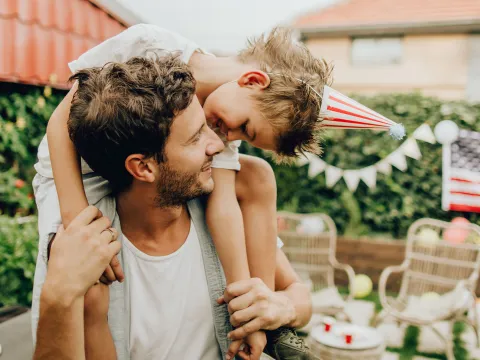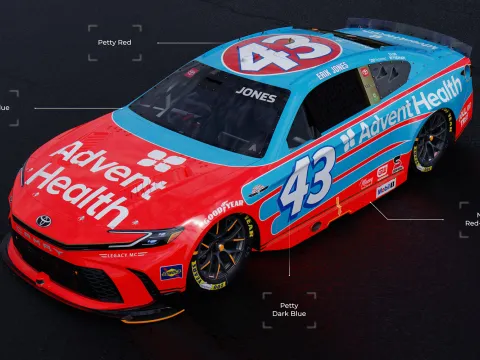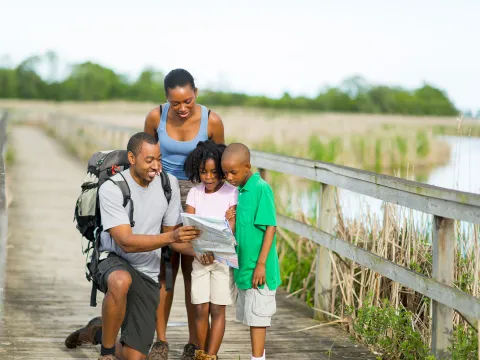- AdventHealth

Summertime is the perfect season to enjoy a picnic outdoors and spend quality time with family and friends. And many might be looking forward to family gatherings, picnics and, of course, fireworks on the Fourth of July.
If your community has reopened and guidelines permit group events, you may still need to practice social distancing and other safety measures to minimize the risk of spreading coronavirus. Bring cloth face masks and hand sanitizer for everyone and mark out your area with picnic blankets so you can stay safely apart from other families.
If your community is not yet permitting group events this year, you can still make the holiday special. Surprise your loved ones with a special picnic and barbecue in your own backyard, complete with their favorite foods and games.
No matter how you celebrate the Fourth of July this year, we want it to be memorable for all the right reasons. Learn how to keep picnic food safe, stay safe in the sun and use fireworks properly with these helpful tips.
Food Safety Tips
Keep uncooked food and leftovers cool.
The risk of food poisoning increases in the summer because bacteria grow faster in warmer weather. According to The Centers for Disease Control and Prevention (CDC), foods left too long in the “danger zone” — between 40F to 140F — can make people sick. Keep raw meat and seafood chilled in a refrigerator or an insulated cooler packed with ice until you’re ready to fire up the grill.
Divide any leftovers into covered, shallow containers and refrigerate them within two hours of cooking or one hour if it’s hotter than 90F outside, the CDC advises. Throw away any remaining perishable food that can’t be refrigerated.
Cook Meat Properly
Use a meat thermometer to ensure you have cooked the meat to a temperature that’s hot enough to kill harmful bacteria. The CDC advises that safe minimum cooking temperatures are:
-
145F for fish, beef, lamb, veal and pork
-
160F for hamburgers and other ground beef
-
165F for poultry and precooked meats like hot dogs
When testing food temperature, place the thermometer in the thickest part of the food and avoid touching bone, fat or gristle, according to foodsafety.gov. Serve cooked food immediately or keep it at 140F or warmer until serving time.
Keep Your Hands Clean
Wash your hands before handling any food and especially after touching raw meat or seafood. Use hand sanitizer if soap and water are not available.
Wash all work surfaces and utensils and use a wet cloth or paper towel to clean the grill before cooking. And avoid a wire cleaning brush because bristles may break free and stick to food on the grill, posing a danger if ingested, the CDC advises.
Separate Raw and Cooked Foods
Throw away any marinades or sauces that have been in contact with raw meat or seafood. Put cooked meat on a clean plate — not the one you used to bring raw foods to the grill. Don’t use the same utensils for raw foods and cooked foods, too.
Stay Safe in the Sun
Protect your family from the sun’s harmful ultraviolet (UV) rays, as they can cause skin cancer from damage that builds up over time. Stay in the shade as much as possible, especially during the middle of the day, by using an umbrella or sitting under a tree or other shelter.
Use a broad-spectrum sunscreen with a sun protection factor (SPF) of 15 or higher on all parts of exposed skin. Reapply at least every two hours and after sweating, swimming or toweling off.
Make sure to use other strategies, too, such as wearing a long-sleeved shirt and pants and a wide-brimmed hat that shades your face, ears and the back of your neck. Wrap-around sunglasses that block both UVA and UVB rays offer the best protection.
Enjoy Fireworks from Afar
It’s fun to ooh and aah at fireworks, but they can cause serious burns and eye injuries when not handled properly. Each year, about 180 people end up in the emergency room with an injury from fireworks every day in the month around the July Fourth holiday, according to the Consumer Product Safety Commission (CPSC).
The best way to stay safe is to let professionals handle the fireworks and attend a public display, if available in your area. Check your local state and county reopening guidelines before heading to a group event, as some celebrations have been canceled this year.
If you’re planning to buy fireworks for personal use, keep your family safe by heeding these tips from the CPSC:
-
Make sure fireworks are legal in your area before buying or lighting them.
-
Avoid buying fireworks packaged in brown paper, since that may indicate they were intended for professional use and may pose a danger to consumers.
-
Always have an adult supervise.
-
Keep a bucket of water or a garden hose ready.
-
Light fireworks one at a time and move back quickly.
-
Never relight or pick up any fireworks that do not light properly.
-
Never point or throw fireworks at other people.
-
Never carry fireworks in a pocket or shoot them from metal or glass containers.
-
When it’s finished burning, prevent a garbage fire by dousing a used firework with lots of water from the bucket or hose before throwing it away.
Special considerations for children:
-
Never allow young children to play with or light fireworks.
-
A lit sparkler can cause third-degree burns if it touches the skin. That’s because sparklers burn at about 1,200F, hot enough to melt some metals, according to the American Academy of Pediatrics. Encourage small children to wave flags instead of using sparklers.
Keeping You Safe Through Every Season
Nothing matters more to us than your health and safety. With special protection measures to keep all patients, visitors and members of our health care team safe in our facilities, we’re always here to support your whole health and wellness, holiday to holiday and year to year.
Learn more about our whole-health care services and learn your nearest AdventHealth emergency room and urgent care locations to be prepared if you need us.


